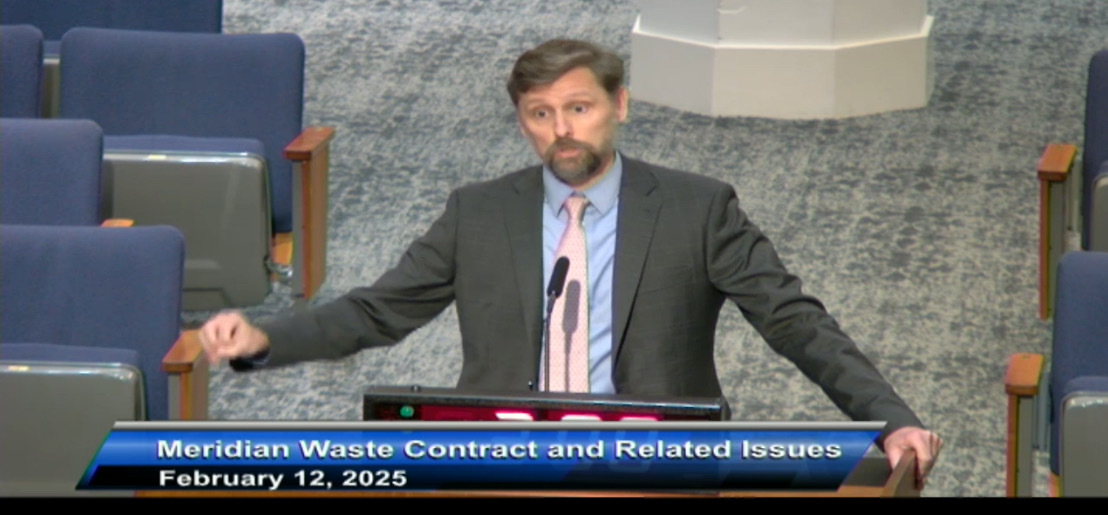Jacksonville’s top lawyer has sided with Mayor Donna Deegan in a spat with the City Council over how much of a raise to give Meridian Waste.
And some members of the legislative branch that confirmed him unanimously less than two years ago now express deep disapproval of General Counsel Michael Fackler, suggesting he’s more aligned with the executive branch.
Deegan vetoed the attempted 29% raise approved on Dec. 10, 2024.
And while the Council overrode that veto, Fackler contends that the ordinance that allows the Council to set rates “violates the principle of separation of powers explicitly stated in the Charter.”
Less than 24 hours after the Council approved a garbage fee increase raising the fee from $151.80 annually to $324 this year and $384 two years from now in an attempt to rectify a fund in deficit for years, many members expressed discomfort with Fackler’s handling of the Meridian morass.
“We have walked into a lawsuit by that vote,” said at-large Republican Ron Salem, saying Meridian would sue for redress.
In response, Fackler (the subject of a no-confidence resolution from Salem and Rory Diamond) noted the “separation of powers” was in discussion in his office since October, well before the vote.
“The message to me was don’t stick my head up” and “offer unsolicited advice,” he said, adding that he did not know if she would veto the bill and was not “authorized to reveal her plans.”
Salem said Fackler told him “the Mayor was (his) client,” and in that context, he wondered who the City Council lawyer was.
“You didn’t advise us,” Salem said.
Fackler offered to provide preemptive legal advice in the future, but it didn’t mollify Salem, who believes Fackler didn’t offer the Council “adequate representation” and that as a result, Meridian could win a lawsuit and several hundred thousand dollars as a result.
Salem also expressed concern that Deegan has line-item veto authority on the budget passed by the Council, saying he’s worried the legislative branch “won’t be controlling the budget.”
He also took issue with Deegan’s claim that Fackler calls “balls and strikes,” saying the lawyer had never sided with the Council; Fackler disputed Salem’s read.
Diamond, a lawyer by training, expressed his own concerns about the “tense” situation, saying he didn’t believe he could do his job “well” without a General Counsel he has “trust” to represent him and not “break confidences.”
“We’re getting live grenades coming at us now that we’re in a lawsuit,” the Beaches Republican said, noting that Fackler had called him once in the last 15 months, a contrast from regular communication from previous General Counsels.
“I don’t reach out affirmatively on every issue,” Fackler said, urging Diamond to see if they could “work together as best (we) can.”
Diamond also suggested “trust wasn’t there” between Fackler and his deputy lawyers.
Southside Republican Joe Carlucci pressed Fackler on how ordinances became law if they didn’t comply with the city charter.
“If the Mayor doesn’t object, then you guys can do whatever you want,” the city’s chief lawyer said, adding that the Mayor in 1976 (Hans Tanzler) signing off on legislation letting the Council set fees wasn’t binding on this one.
“Don’t change the rules of the game,” Carlucci would say later on in the discussion, after colleagues expressed frustration over the lawyer and opinions they believe are tailored to the Mayor’s agenda.
At-large Republican Nick Howland worried about “further breakdown” between the Mayor and City Council in light of Fackler’s opinion.
Northside Republican Mike Gay likewise said he felt the Council had been “hung out to dry” from the lawyer’s novel interpretation of long-standing law.
“This whole thing was a set up,” added Southside Republican Kevin Carrico, the Council Vice President.
Former President Randy White wondered if the Council could appeal to the Florida Attorney General for an opinion on separation of powers. Fackler advised that he didn’t believe they could.
Westside Democrat Dr. Rahman Johnson said it was “almost dysfunctional” that the General Counsel could represent the Mayor’s Office and City Council simultaneously during conflicts like this. Told of the Office of General Counsel process in arriving at decisions, Johnson wondered if the Council would have access to those deliberations where city lawyers figure out strategy and binding opinion.
“I think what I would say is no,” Fackler said, saying the interest was in his lieutenants being “candid” with him.
The hits kept coming.
“I just don’t believe we have an overall General Counsel for the City Council,” said at-large Republican Chris Miller.
Post Views: 0

 Entertainment8 years ago
Entertainment8 years ago
 Entertainment8 years ago
Entertainment8 years ago
 Politics8 years ago
Politics8 years ago
 Tech8 years ago
Tech8 years ago
 Tech8 years ago
Tech8 years ago
 Tech8 years ago
Tech8 years ago
 Politics8 years ago
Politics8 years ago
 Tech8 years ago
Tech8 years ago











